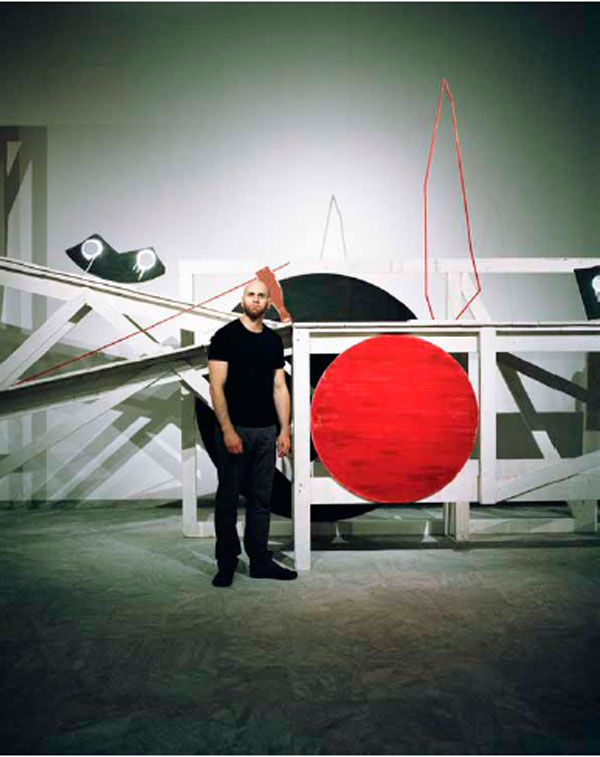
Kostis Velonis is what could easily be described as a ‘a significant artist of the younger generation’. However, he is far from being just that; a restless spirit, one that dares to deal with difficult issues during hard times. At 42 and through his current exhibition at the national Museum of Contemporary Art in Athens he hangs between nostalgia and utopia, wanting to speak on today’s loneliness through the collective failure of the past.
Do you believe that art is inevitably political and do you feel political yourself as a contemporary artist?
Art has always been a place where politics take place. It offers vision, positions, controversy, resistance, criticism, aesthetics, ways of living. Through this framework and in accordance to my role I invent and formulate politics and nothing more. Politics of art is essentially the difference from the current ‘politics’ of politics. Politics of art is heterogeneity and differentiation in all tangible levels as well as an ability to transform how life is practised.
In your exhibition at the National Museum of Contemporary Art in Athens there are references to the Russian avant-garde as well as the ancient Greek democracy. What is it that mostly attracts you in each of these concepts and what do you think might be their significance today?
In both cases there is a need for artistic production that coexists with state structure; one that forms a point of reference for its citizens and being an ‘avant-garde’, it holds a critical stance against certain traditions. The October Revolution as well as the Democracy of Pericles both demonstrate a ‘building zeal’. They apply an architectural programme with significant implications in many levels. There is therefore a construction prototype at the foundations of every expression of power and democracy is not an exception to that. Naturally there are major variations and differences, often irreconcilable ones, which are expressed in an exhibition and in individual projects that themselves become the subject of criticism. A radical vision of an art that contributes actively in the every day life and is liberated from being a one-sided passive propaganda is what I am interested in developing at a historical level. I am also being aware that certain contemporary circumstances in recent times, make such manifestations absolutely necessary. A society made up by active subjects must create the right conditions for competitiveness and healthy dispute and not eliminate conflicts. Within the confined space of the Russian avant-garde certain creative clashes took place. At the same time the divisions within the political management of power lead to mass killings… However we must have the courage to chose and clarify our intentions as this is democracy.
What is it that interests you in the failure of ideological movements of the past?
Failure is almost catholic in any organised utopia, at least at the moment it tries to become feasible. However, there is a quantitative issue: whether the reason behind the utopia remains in the naiveté of a text or whether it leads to millions of deaths. And such distinction calls for scepticism, as it is nothing but trivial. Nevertheless I also consider failure in a personal level, usually as a counterpoint to the weight of history. Failure that begins with the betrayal of history and ends with a relationship breakdown.
In your view which is the collective ideological movement of our time and what could be the utopia following the present world economy crisis?
One should be suspicious of utopias. In utopias towards the left for example where according to Marx, on the ‘highest state of communism’ one is released from years of labour and is free to practice hobbies, we see that centralised socialism produced human consciousness deprived from happiness. At the same time the utopia of a thoughtless abundance in the framework of financial capitalism produced a number of crises, both ethical and ecological. Profit and greed are the distractive forces of our time. Are we ready to replace the current intentional utopia bred by politicians and religious leaders? There is a tendency, one that has always been but whose necessity lately is immediate, for a community logic where claims are instant and usually call for modest solutions. Some would call this self-management, some otherwise, I wouldn’t dwell on the ideological interpretation. What is crucial is that the time has come to let go of certain conveniences the western societies have offered. We need to abandon them and decide the ways we could contribute.
What is it that you dream of?
Once I used to dream easily, now I have learnt to be content with what is occurring. > The exhibition ‘Kostis Velonis, Loneliness on Common Ground: How Can Society Do What Each Person Dreams’ curated by Dafni Vitali is on until 5th of September 2010.
T: 210 92 42 111
Link:kostisvelonis
Interview: YORGOS KELEFIS/ Photography: NIKOLAS VENTOYRAKIS



